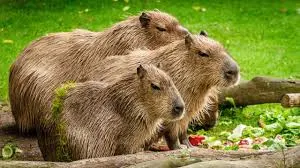Today I want to expand our topics and write about an animal that I find very interesting. These animals are rodents that are native to South America. They are known to be very gently and charming. Some people have been successful in having a Capybara as a pet, but there are many things that must be done to keep one healthy and happy. I hope you are ready to learn about them and make a decision about whether they would be pet material for you or yours. Let me know in the comments what you decide.
These charming creatures are the largest rodents globally, known for their docile nature and quirky appearance. In this post, we'll try to see what makes capybaras unique and what it takes to keep them as pets.
Legal Considerations
Before you get captivated by their charm, it's crucial to understand the legalities. Owning a capybara is not like having a cat or a dog. In many places, special permits are required, and in some areas, it's outright illegal. Always check with local wildlife authorities to ensure you're compliant with the law.
Caring for a Capybara
Capybaras are not your average pet. They require a diet rich in grasses and water plants, mirroring their natural habitat. These animals need ample space to roam and, importantly, access to a large water body for swimming, as they are semi-aquatic. Their enclosure should mimic their natural environment to keep them happy and healthy.
Social Behavior
Capybaras are incredibly social and thrive in groups. Isolation can lead to depression and behavioral issues. They bond well with humans and can coexist peacefully with other animals, including cats and dogs, making them a delightful addition to a diverse pet household.
Challenges
However, capybaras come with their own set of challenges. They grow quite large, up to 140 pounds, requiring significant space. Their need for a watery habitat means not every home environment is suitable. Additionally, finding a vet experienced with exotic pets can be a challenge.
Success Stories
Despite these challenges, many have found joy in capybara companionship. Stories from owners highlight their affectionate nature, intelligence, and playful antics. Interviews with capybara owners reveal a unique bond and a rewarding experience, albeit with a need for commitment and understanding of their needs.
Owning a capybara is a journey filled with unique challenges and joys. It's a commitment to providing a suitable environment, companionship, and care. But for those willing to take on the responsibility, a capybara can be a loving and extraordinary pet, offering a glimpse into a wilder side of life.
Okay, what do you think? I don't think I could manage to have a capybara myself because of the size and water habits. I live in the South and sometimes water is hard to find. Aside from my issues, I do think that they are really cute and who would have thought they were classified as rodents?
Here are some links for resources if you decide you want one:
https://www.thesprucepets.com/capybara-pet-4101211
https://wildwelfare.org/wp-content/uploads/Care-for-us-Capybara-1.pdf







